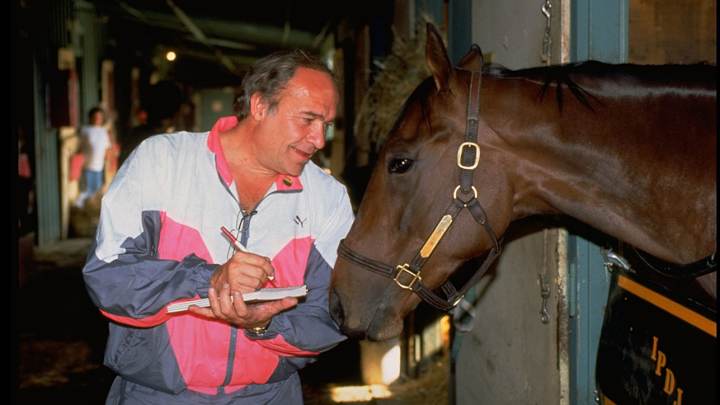Best of William Nack's Sports Illustrated Stories

Longtime Sports Illustrated writer William Nack died at the age of 77 on Friday. Over his 23 years with the magazine, from 1978-2001, he penned some of SI's best-known pieces on sporting icons like Secretariat and Jackie Robinson.
Below is a snapshot of Nack's terrific work with SI.
Pure Heart
Description: In waging the most glorious Triple Crown campaign ever, Secretariat made racing history in 1973. In the doing, he took the author on an unforgettably exhilarating ride.
SI 60 Q&A: William Nack on what 'Pure Heart' and Secretariat mean to him
Excerpt: The Secretariat phenomenon, with all the theater and passion that would attend it, had begun. Florio was right, of course, and by the end of Secretariat’s 2-year-old season, everyone else who had seen him perform knew it. All you had to do was watch the Hopeful Stakes at Saratoga. I was at the races that August afternoon with Arthur Kennedy, an old-time racetracker and handicapper who had been around the horses since the 1920s, and even he had never seen anything quite like it. Dropping back to dead last out of the gate, Secretariat trailed eight horses into the far turn, where jockey Ron Turcotte swung him to the outside. Three jumps past the half-mile pole the colt exploded. “Now he’s runnin’!” Kennedy said.
Bobby Fischer
Description: While conducting a search that turned into an obsession, the author discovers a great deal about the chess genius who drifted into seclusion after winning the world title.
Excerpt: But Fischer is still alive, and still very much on many minds. Until recently Robert J. Fisher lived in Pasadena, just about a mile east of where Bobby was arrested in 1981 for allegedly holding up a bank. Fisher installs cable television and spells his name without the "c," but over the years he has received telephone calls from all over the world, often at three in the morning, awakening to hear:
"This is the international operator, Mr. Fisher. You have a telephone call from Yugoslavia." Or the Soviet Union, or Czechoslovakia, or Bulgaria, or Germany.
The Breakthrough
Description: Fifty years ago, over 14 games in May, Jackie Robinson erased any doubt that he belonged in the majors, clearing the path for other black players.
Excerpt: Despite all he had on his mind, despite all he had endured during the early days of that long season, it had grown clear by mid-May that Robinson, even a struggling Robinson, was in the Brooklyn lineup to stay. "The guy just had too much talent," says Reese, "and too much guts." Indeed, Robinson had won over teammates and opponents alike during his 14-game hitting streak, which was all the more impressive because it was a direct response to a horrible slump that would have finished lesser men in his situation.
Twilight of a Titan
Publish date: September 30, 1991
Description: As his unparalleled racing career winds down, A.J. Foyt still looks for fulfillment.
Excerpt: In this age of complex, time-consuming specialization, when drivers rarely stray for long from their corners of the sport, Foyt leaves behind a career so diverse it may never be matched. Certainly no other man in the history of motor sports has done what he has over the last 35 years, winning not only those four Indy 500s, a record at the time, but also all those races in the sport's other disciplines, in radically different cars: the Daytona 500 stock car race; and the 24 Hours of Le Mans, the 24 Hours of Daytona (twice) and the 12 Hours of Sebring, all sports car races.
'The Fight's Over, Joe'
Publish date: September 30, 1996
Description: More than two decades after they first met in the ring, Joe Frazier is still taking shots at Muhammad Ali, but this time it's a war of words.
Excerpt: He has known for years of Frazier's anger and bitterness toward him, but he knows nothing of the venom that coursed through Frazier's recent autobiography, Smokin' Joe. Of Ali, Frazier wrote, "Truth is, I'd like to rumble with that sucker again—beat him up piece by piece and mail him back to Jesus.... Now people ask me if I feel bad for him, now that things aren't going so well for him. Nope. I don't. Fact is, I don't give a damn. They want me to love him, but I'll open up the graveyard and bury his ass when the Lord chooses to take him."
The Wrecking Yard
Description: As they limp into the sunset, retired NFL players struggle with the game's grim legacy: a lifetime of disability and pain.
Excerpt: Johnny Unitas once owned the most dangerous right arm in the NFL. Today he barely has use of the hand attached to it. Unitas, who is considered by many to be the greatest field general to play the game, is still paying for a hit he took more than three decades ago as a Baltimore Colt. That day in 1968, Unitas was drawing back his arm to throw a pass when a Dallas Cowboy mashed the inside of his elbow. Unitas came back to play again--the arm seemed fine up through his retirement in 1974—but by the mid-1990s he was having problems with the nerves that controlled his hand and fingers. He lost strength and feeling in the hand and became unable to rotate the thumb back and grasp objects. The symptoms only got worse. Now Unitas cannot close the hand that made Raymond Berry famous.
